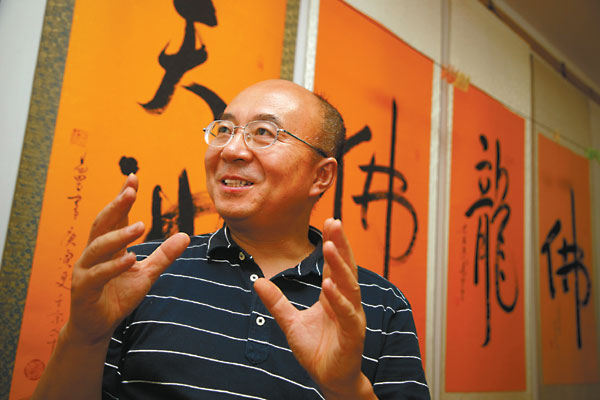
In order to comment on State affairs and provide advice or criticism, representatives have to conduct in-depth research, including fieldwork and brainstorming sessions with members of the China Association for Promoting Democracy, before each session.
"We are happy that our advice is often acknowledged and adopted," she said. "That allows us to fulfill our duty as party participating in State affairs."
Of course, not every piece of advice will be adopted, but openness and an awareness of wide-ranging opinions are essential, according to Zhang Xuedong, a member of the central committee of the Jiu San Society, another of China's non-communist parties.
 |
|
In the past 15 years, Zhang Xuedong, a member of the central committee of the Jiu San Society - one of eight non-communist parties active in China - has made 23 proposals, most of which have been acknowledged by the government. Non-communist parties have more than 700,000 members in total, dotted around both urban and rural areas and drawn from a variety of ethnic groups. Kuang Linhua / China Daily |
"The government is open to the advice it requests before making significant decisions. Those decisions could be made simply by administrative order," said Zhang. "Our input certainly helps them make the right decisions and also allows people outside the CPC to feel respected."
In the past 15 years, Zhang has made 23 proposals, most of which were acknowledged by the government.
In the 1990s, Zhang and other leaders of the Jiu San Society once spent an entire year conducting research into agricultural development in Beijing and provided advice to the municipal government, according to Zhang. Led by their party president, members traveled to Beijing's agriculture bases in the suburbs almost every weekend.
"Proposals have to be deep, rich and insightful, otherwise they won't be adopted," said Zhang, who also attends consulting sessions held at various levels of government, four to five times a year.
Last year, the city of Taiyuan, in Shanxi province, proposed building a theme park featuring miniatures of famous Chinese landmarks to boost tourism. The local authorities invited Zhang, a former engineer, and experts from other non-communist parties to evaluate the feasibility of the project.
Zhang was not impressed: "Who would go to see a fake Great Wall if he were able to travel to see the real one?" he asked. The experts dismissed the project as impractical, but that needed to be communicated with great subtlety, he said.
"If you simply dismiss a project without giving any solid reason, your advice can be easily overlooked," he said.
To persuade the local government to reject the project, Zhang and other members of panel collated examples of the failure of similar theme parks, both in China and overseas, and instead produced an alternative proposal to clean up a polluted river to build a nature reserve.
"We played our presentation to the mayor slide by slide," he recalled. "And finally, the proposed theme park was rejected. In another case, a village administration wanted to build a 50-story apartment block, because they thought that "tall buildings are the symbol of modernization". However, the cost of the project far outstripped the annual gross domestic product of the village, according to Zhang.
"We suggested that the head of the village held a public poll on the idea. The result showed that 90 percent of residents were opposed to the plan and the project was subsequently cancelled," he said.
He said the advice offered must be professional and practical, but not extreme. One proposal from a Jiu San Society member was that medical staff nationwide should be discharged if they made any mistakes.
"Some people might applaud that proposal because it takes the side of patients, but it's neither fair nor reasonable," he said. "It shouldn't, and won't, be adopted."